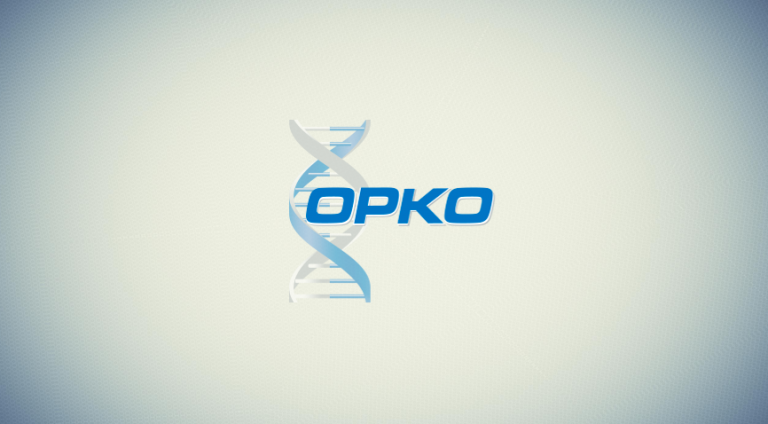
Opko Health, Inc. (NYSE:OPK) has had a rough eight months. At its peak valuation in 2015, the company traded for just shy of $20 a share. At last close, it traded for $7.89 – a 63% decline. A look at the underlying fundamentals, however, suggests the decline may just be a response to the wider biotech sector downturn, and further, that some near term catalysts could initiate a turnaround during the second and third quarters of 2016.
Click Here For More Market Exclusive Updates & Analysis
Opko is a Florida based biotech, with two primary business operations: pharmaceuticals and diagnostics. It has a robust pipeline and a strong portfolio of products and drugs that generated $143 million revenues in Q3, over triple the previous quarter. The company’s therapeutics division includes drugs for human growth hormone deficiency and obesity, and its diagnostics division developed and commercialized its flagship product, the 4K Score Test – a cancer diagnostics tool that offers a non-invasive method of testing for a patient’s percentage chances of contracting prostate cancer.
So what might catalyze a turnaround? Fundamentally, the company looks stronger now than ever. It has gradually narrowed its negative bottom line over the last 12-18 months, and Q3 was the first time Opko reported a net gain. At the end of the quarter, the company had $212 million in cash on its books. For the final quarter of 2015, which is to be reported on February 26, analysts expect $286.5 million, a mean calculation across six analysts – a more than 90% quarter over quarter gain.
Which brings us nicely to reversal catalysts.
If financials come in as expected, we should see some upside. The FDA approved an anti nausea drug called Varubi back in September last year, and Opko is set to receive milestone payments from the company Tesaro, Inc. (NASDAQ:TSRO), from which Opko licensed the drug. Exact details are undisclosed, but we should see some representation of these revenues affect upcoming earnings.
Shortly after the earnings release, the FDA is set to report its decision on Rayaldee, a secondary hyperparathyroidism (SHPT) drug that met all its primary endpoints in a 105 center study that concluded early last year. There’s no current treatment available in this indication, and it’s a 20-million US patient population, so approval could be a real upside catalyst for Opko. PDUFA is set for March 26, 2016, and keep an eye out for an advisory panel review over the next few weeks.
There is also Opko’s notable acquisition activity. Dr. Phillip Frost, CEO and Chairman of Opko, is renowned in the biotech space for strategic investment, and aside from the numerous investments Opko has already made, Frost just orchestrated another large share purchase in Xenetic Biosciences, Inc. (OTCMKTS:XBIO). Xenetic is a development stage biotech, and Frost through Opko has just picked up a 6.3% holding. This puts Opko alongside Baxalta Inc. (NYSE:BXLT), which also has a stake in and a licensing agreement with Xenetic from back before it split from Baxter International (NYSE:BAX).
From a Frost quote issued alongside the share purchase release, it looks as though the buy is primarily driven by Xenetic’s oncology candidates – specifically its OncoHist drug. The drug is currently in phase I/II trials for both a non-Hodgkin’s Lymphoma (NHL) and acute myeloid leukemia (AML), and Xenetic is reportedly looking to kick off another trial for the latter indication in the US this year. Baxter invested in Xenetic for its PolyXen technology, which is being developed as a hemophilia drug in order to increase drug half life and potency by protecting it from the immune system.
Xenetic’s lead candidate is a once-monthly formulation of erythropoietin, which is currently used to treat anemia patients in the US. It’s in phase II/III pivotal trials in Russia and India, and chances are we will see a US or European trial kick off before the end of 2016, driven by Frost and Opko.
Finally, we’ve got phase III top-line results set for release before the end of the year from Opko’s collaboration with Pfizer Inc. (NYSE:PFE). The trial is targeting growth hormone deficiency with hGH-CTP, an extended release growth hormone candidate, and if the ongoing phase III hits endpoints, Opko has given us a guideline of regulatory submission, before the close of the year. Phase II data was promising, and both top-line release and NDA submission will be upside catalysts if things run smoothly.
Conclusion
While nearly all markets have sold off heavily over the last several months, not the least of which has been Opko, there are a number of pending catalysts that could instigate a reversal. There are risks, of course. While Opko is expected to boost revenues QoQ for the final quarter of 2015, analysts expect a return to a negative bottom line for the period, and an annual net loss is inevitable. Further, despite promising to-date data, an hGH-CTP approval is far from guaranteed.
Looking at things from a broader perspective, markets are switching to risk off at the moment, and this has an impact in the development stage biotech space to a higher degree than in many other, more conservative, spaces. Opko’s already approved diagnostics and therapy products should mitigate this risk somewhat (i.e. it won’t take as hard a hit as a company with no approved products might) but it’s worth keeping in mind.
Bottom line – a deep discount to last year’s highs while much closer to key approvals, backed and run by a renowned biotech billionaire, plenty of near term upside catalysts, but not without its risk against a backdrop of wider market weakness and speculative caution.




